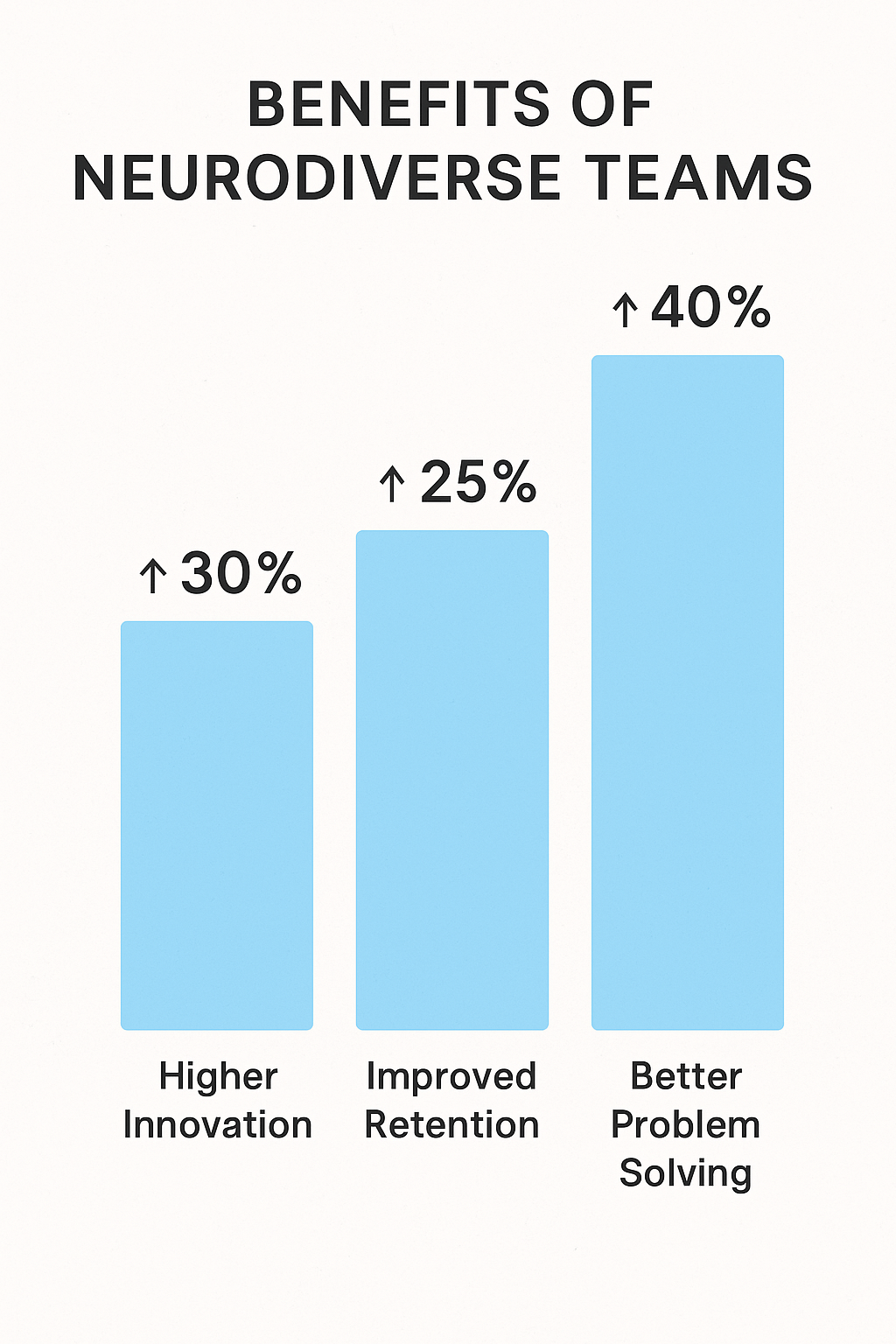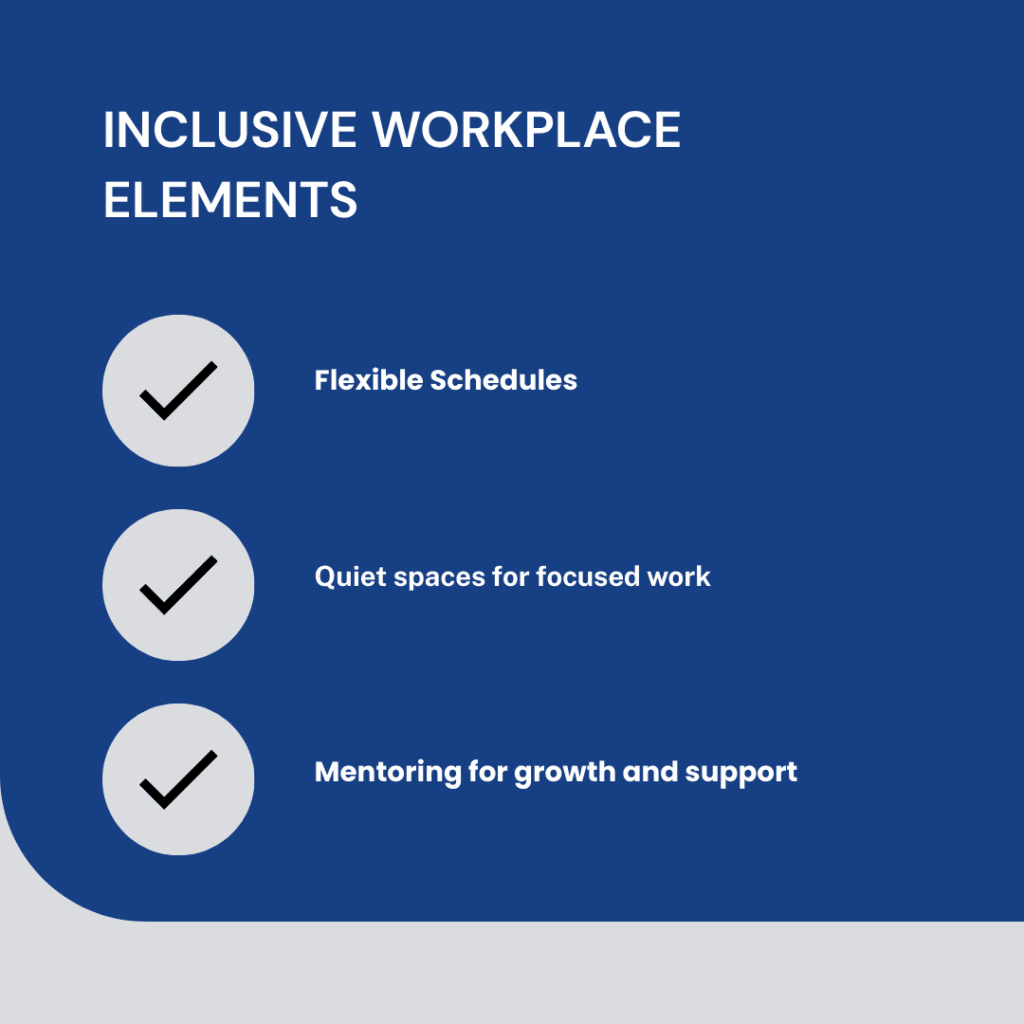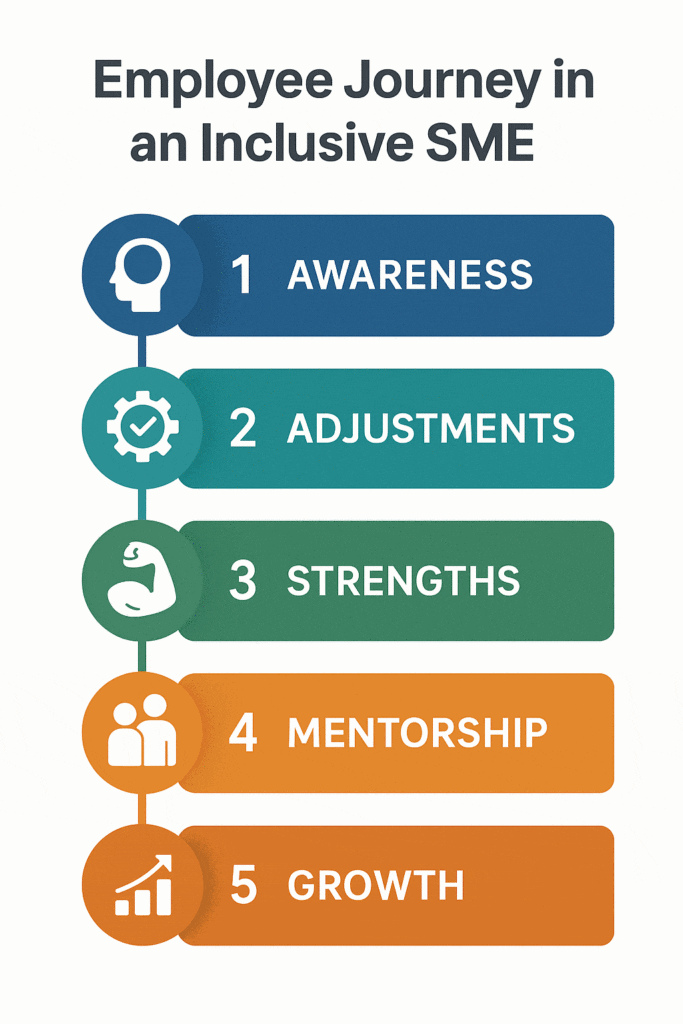Introduction: Why Neurodiversity Matters
Neurodiversity describes the natural variation in human brains and the way people think, learn, and process information. It includes conditions such as autism, ADHD, dyslexia, and dyspraxia. Far from being barriers, these differences can fuel creativity, problem-solving, and innovation.
For small and medium-sized enterprises (SMEs), where agility and fresh ideas often drive growth, embracing neurodiversity is both a moral responsibility and a strategic advantage. Businesses that build inclusive cultures not only support employees—they also unlock new ways of thinking that give them a competitive edge.
The Business Value of Neurodiversity in SMEs
Neurodivergent individuals often excel in areas that traditional workplaces undervalue. Some may show remarkable attention to detail, while others approach challenges with fresh creativity or unconventional problem-solving methods.
Research backs this up. A 2024 Deloitte Insights report found that companies embracing neurodiversity see higher innovation levels, better problem-solving skills, and improved retention rates. For SMEs, this is especially important. With limited resources, tapping into the strengths of neurodivergent employees means accessing unique skills and perspectives that larger firms may overlook.

Creating a Workplace Where Neurodiversity Thrives
Building an inclusive environment requires intention and effort. It’s not about ticking a diversity box—it’s about making genuine, thoughtful changes that allow all employees to thrive.
One of the first steps is awareness and education. Many employees may not fully understand what neurodiversity means. Training sessions, workshops, and open conversations can break down stigma and build a more accepting culture.
Workplace adjustments are another cornerstone. Simple changes, such as offering quiet workspaces, flexible schedules, or alternative ways to communicate, can make a world of difference. For example, some neurodivergent employees may perform best when given clear, structured instructions, while others may benefit from flexible project timelines.
Equally important is clear communication. Using concise language, visual aids, or step-by-step guides can help reduce misunderstandings and ensure that everyone feels included. This doesn’t just benefit neurodivergent employees—it improves workplace communication overall.

Shifting the Focus: From Challenges to Strengths
Too often, discussions about neurodiversity focus only on challenges. SMEs that truly embrace inclusion shift the narrative towards strengths and opportunities.
For example:
Someone with autism may excel in tasks requiring high precision and accuracy. An employee with ADHD may thrive in dynamic, fast-paced projects that demand creativity and adaptability.
By recognising these strengths and aligning them with business needs, SMEs not only empower employees but also unlock performance gains across the organisation.
Supporting Growth and Development
Inclusion doesn’t stop at hiring. Neurodivergent employees thrive when they see a clear path forward. Structured career development programs, regular feedback, and mentoring help employees feel valued and motivated.
Peer support groups and mentorship networks also create a sense of belonging. When neurodivergent employees have access to role models and supportive colleagues, they are more likely to stay engaged and invested in their work.
Measuring Success in Neurodiverse Inclusion
To ensure efforts are working, SMEs should measure progress. Tracking retention rates, productivity, and employee satisfaction provides valuable insight. Surveys and feedback sessions specifically tailored to neurodivergent employees can highlight areas for improvement.
This approach creates a cycle of continuous improvement, where inclusion isn’t a one-time project but an evolving part of the company culture.
Why Inclusion Helps Attract Top Talent
Today’s job seekers are increasingly prioritising inclusive employers. SMEs that champion neurodiversity not only gain access to neurodivergent talent but also attract professionals who value diversity, equity, and inclusion. This strengthens the company’s brand and helps it stand out in a competitive hiring market.

FAQs on Neurodiversity in SMEs
- What does neurodiversity mean in the workplace?
It refers to recognising and valuing differences in how people think, including autism, ADHD, and dyslexia, as assets rather than limitations. - Why is neurodiversity important for SMEs?
It boosts innovation, enhances problem-solving, and improves employee retention—all vital for smaller businesses. - What practical steps can SMEs take to support neurodivergent employees?
Provide awareness training, offer flexible working arrangements, adjust communication styles, and implement mentoring programmes. - Is creating a neurodiverse workplace expensive?
Not necessarily. Most accommodations, such as flexible hours or quiet spaces, are low-cost yet high-impact. - How do SMEs measure success in neurodiversity initiatives?
By tracking KPIs such as retention, engagement, and productivity while regularly gathering employee feedback.
Conclusion: The Competitive Advantage of Inclusion
For SMEs, embracing neurodiversity is more than just a workplace trend – it’s a pathway to sustainable growth and innovation. By fostering an environment where every individual feels supported and valued, small businesses gain access to untapped talent and fresh perspectives.
Neurodiversity isn’t simply about inclusion – it’s about unlocking human potential to build stronger, more adaptable, and future-ready organisations.
